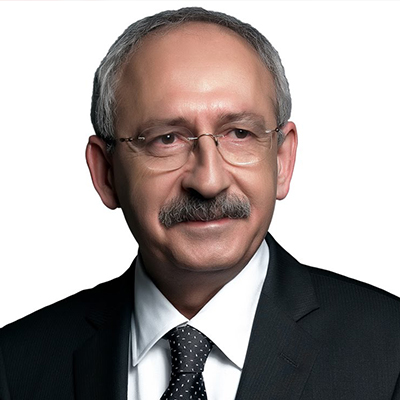CHP
CHP

Head
Kemal Kılıçdaroğlu
CHP was first established on September 9, 1923 under the name "People's Party" under the leadership of Mustafa Kemal Atatürk. In 1924, it became the "Republican People's Party," and in 1935, it changed its name to the "Republican People's Party." In 1927, "Republicanism," "Populism," "Nationalism," and "Secularism" were adopted as the party's four basic principles. In 1935, the principles of "Statism" and "Revolutionism" were added, bringing the party's principles to six. The emblem of the party, the six arrows, symbolizes these principles.
"Kemalism" was officially recognized with the CHP Program, which was adopted at the Fourth Grand Congress of the CHP in May 1935. The program's "Introduction" section includes the following evaluation of Kemalism: "The main ideas that form the basis of the Republican People's Party program have been presented plainly with the works that have been done from the beginning of the Turkish Revolution until now. In addition, the main ideas have been identified in the general principles of the bylaws approved by the Party Congress in 1927, in the statement issued by the General Presidency, which was also approved by the same congress, and in the statement issued in connection with the 1931 general elections. The main outlines of our plans, which cover not only a few years but also the future, are written here together. All of these principles pursued by our Party are Kemalist principles."
The CHP's 27-year single-party rule ended after the 1950 elections. The 1950 defeat and the loss of power were a significant turning point for the CHP. During this period, the party's rejuvenation became one of the most important agenda items. In the CHP Congress held in June 1950 immediately after the election defeat, Kasım Gülek was elected Secretary-General against Nihat Erim and Şemsettin Günaltay, who were candidates for General Secretary with İsmet İnönü as party leader. Gülek's election as Secretary-General was a surprise to traditional CHP members. After the 1950 elections, the CHP was also unable to achieve the desired success in the 1954 elections.
After suffering another defeat against the AP in the 1969 elections, the CHP highlighted the principle of "the one who cultivates the land and the one who uses water" in its rhetoric during the 1970s.
Bülent Ecevit, who opposed the military memorandum on March 12, 1971, also objected to the CHP party's decision to appoint ministers to the government formed by Nihat Erim after the memorandum. When his request was not accepted by the party leader İsmet İnönü, he resigned from the position of Party General Secretary, although he never completely severed his ties with the party. Instead, he did not take any steps to strengthen his relationship with the party organization. In the Extraordinary 5th Congress of CHP held in May 1972, Bülent Ecevit and İsmet İnönü faced each other. While İsmet İnönü said "Either me or Ecevit," Bülent Ecevit said in his speech: "I am telling you openly, will we be free members of a democratic party who respect the laws, or will we be servants? The decision is yours." The Ecevit team won the vote of confidence in the congress, so İsmet İnönü resigned from the party leadership. In the general leadership election held on May 14, 1972, Bülent Ecevit became the third party leader of CHP after Mustafa Kemal Atatürk and İsmet İnönü, receiving the majority of the delegates' votes. After being elected party leader, Bülent Ecevit decided to withdraw from the interim regime government established on March 12. Shortly after this decision, Kemal Satır and his colleagues left the party. Satır and his colleagues, who founded the Republican Party, later merged with the Confidence Party founded by Turhan Feyzioğlu, and formed the Republican Confidence Party.
In 1973, CHP entered the elections under the leadership of Bülent Ecevit. The party, which entered the elections with slogans of change, had a detailed manifesto called "Ak Günlere" (To Brighter Days). CHP, which wanted a just order to be established, presented a detailed program in its election manifesto. As a result of the solidarity it established with the masses during this period, CHP became the first party in the elections with 33.3% of the vote. Although it entered the Grand National Assembly with 185 MPs, it could not form a single-party government. When a coalition with the AP could not be formed, a coalition government was formed with the National Salvation Party led by Necmettin Erbakan. This coalition government, which faced intense structural disagreements, lasted for about 9 months.
In 1992, a legal regulation was made during the DYP-SHP coalition government period, removing the legal obstacles to the reopening of political parties that were closed after the September 12 coup. Thus, 69 years after its first opening on September 9, 1923, CHP was reopened on September 9, 1992. The CHP congress held with the delegates from 1979 before the September 12 coup decided to reopen the party under the same name and emblem, and Deniz Baykal was elected as the party leader.
After the April 1999 elections, a coalition government was formed by DSP-ANAP-MHP. During this period when CHP was not in parliament, the 2001 crisis occurred. After falling below the electoral threshold, party leader Deniz Baykal resigned on April 21, 1999, and Altan Öymen became the new leader. However, when Altan Öymen could not pass some of the decisions he wanted through the administration, an extraordinary convention was held in the fall of 2000. As a result of the convention held on September 30, 2000, Deniz Baykal was re-elected as party leader. Baykal declared to the CHP organization that called him to duty that he would come to power to end the fights in the party. In the general elections held on November 3, 2002, CHP re-entered Parliament as the main opposition party with 19.4% of the vote.
Before the constitutional referendum, following the tape trap against the CHP party leader, Deniz Baykal resigned and the party organization elected Kemal Kılıçdaroğlu as the new party leader for the new era. At the 33rd Ordinary Congress held on May 22, 2010, Kemal Kılıçdaroğlu became the 7th party leader by receiving 1189 of the 1197 valid votes cast.
Kemal Kılıçdaroğlu was re-elected as party leader by receiving all 1164 votes at the 34th Ordinary Congress held on July 17-18, 2012.
In the 2014 local elections, CHP maintained its existing vote share by receiving 26.3% of the votes. In the 2014 presidential elections, a decision was made to nominate Ekmeleddin İhsanoğlu, former Secretary-General of the Organization of Islamic Cooperation, as the joint candidate with the Nationalist Movement Party. After losing the presidential elections, the party leader called for an extraordinary convention and was re-elected by most of the delegates' votes at the 18th Extraordinary Congress held on September 5-6, 2014. In the renewed elections held on November 1, 2015, CHP received 25.3% of the votes, while AK Party increased its votes and became the sole ruling party with 49% of the vote.
Kemal Kılıçdaroğlu was elected as party leader for the fourth time at the 35th Ordinary Congress held on January 16, 2016, where he ran as the only candidate.
